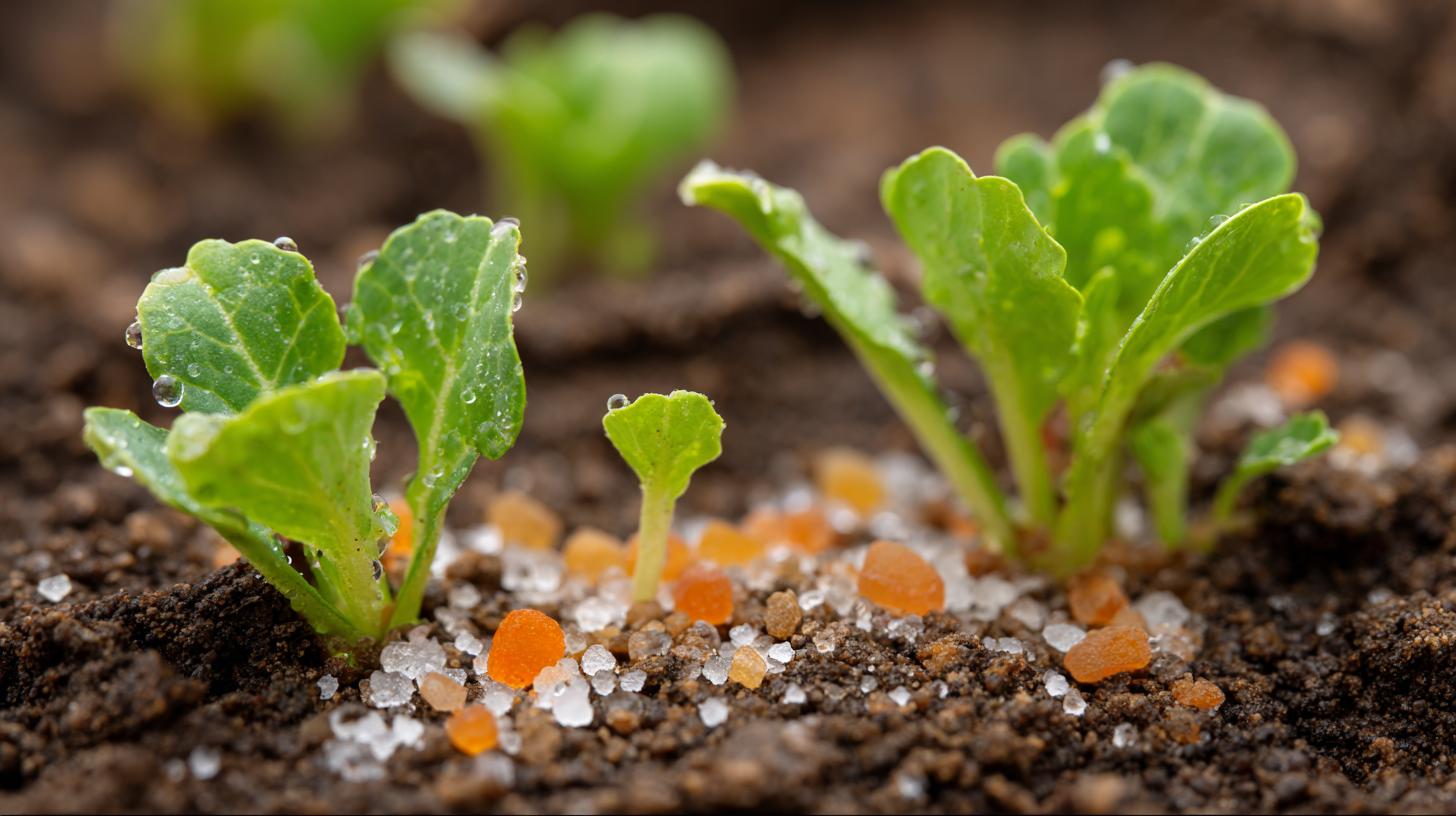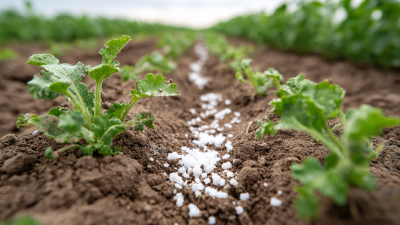Unlocking the full potential of plants is a critical focus in modern agriculture, with specific fertilizers playing a vital role in enhancing crop yields and quality. Among these, Calcium Nitrate Boron Fertilizer has emerged as a key player due to its dual benefit of providing essential nutrients to plants while improving soil health. Industry reports indicate that the global market for calcium fertilizers is projected to reach USD 2.24 billion by 2027, indicating a growing recognition of the importance of calcium in agricultural practices.

Calcium Nitrate Boron Fertilizer not only promotes robust root development but also enhances the fruit set and quality in various crops, making it invaluable for growers. By understanding the science behind this fertilizer's composition and its impact on plant physiology, farmers can optimize their usage to achieve higher yields and better crop resilience against environmental stresses.
Calcium nitrate boron fertilizer is an essential component in modern agricultural practices, particularly noted for its dual action of providing crucial nutrients—calcium, nitrate, and boron. Calcium is known to strengthen cell walls and improve plant structure, while nitrate serves as an efficient nitrogen source. Boron, though needed in trace amounts, plays a vital role in various physiological processes, including pollen formation and the development of apical meristems. According to the International Fertilizer Association, deficiencies in boron can lead to reduced yields of crops like fruits and vegetables by up to 30% under certain conditions.
Research indicates that the use of calcium nitrate boron fertilizer can significantly enhance crop quality and yield. A study published in the Journal of Agricultural Science showed that tomatoes treated with this fertilizer not only exhibited increased fruit size but also showed a 15% improvement in total yield compared to those receiving conventional fertilizers. Moreover, the combination of calcium and boron facilitates better nutrient uptake and promotes healthy root development, which is crucial for sustaining plant growth in nutrient-deficient soils. As agriculture moves towards precision farming, understanding and utilizing calcium nitrate boron fertilizer becomes increasingly important for optimizing crop performance and ensuring food security.

Calcium plays a crucial role in plant growth and development, acting as a vital component of cell walls and membranes. Its presence ensures structural stability, allowing plants to maintain their integrity and resist various stressors. In addition to this structural function, calcium supports vital processes such as cell division and elongation, which are fundamental for root and shoot development. The availability of calcium within the plant improves its overall vigor, enabling it to better absorb nutrients and water.
Moreover, calcium contributes to enzyme activity and the overall metabolic functions within the plant cells. It aids in the regulation of stomatal closure, which helps manage water loss and optimize photosynthesis. When combined with other nutrients, such as boron in calcium nitrate boron fertilizers, calcium enhances the nutrient uptake efficiency, promoting healthier and more productive crops. The synergistic effect of calcium and boron fosters strong root systems and improves flowering and fruiting processes, thus unlocking the potential for higher yields and better crop quality.
Boron plays a crucial role in plant health and nutrient uptake, making it an essential micronutrient for crops. It facilitates various physiological processes, including cell division and elongation, as well as the development of reproductive organs. A deficiency in boron can lead to poor plant growth, reduced yield, and low-quality produce. This is particularly evident in crops such as fruits and vegetables, where boron is vital for flower formation and seed development, underscoring its importance in the agricultural industry.

The synergy between calcium nitrate and boron enhances nutrient absorption and improves overall plant performance. Calcium nitrate provides a readily available source of calcium, which aids in cell wall stability and stimulates root development. Meanwhile, boron aids in the movement of carbohydrates and the synthesis of vital hormones. Together, they support a healthy plant environment that maximizes nutrient uptake and enhances resistance to various stress factors.
Understanding this relationship helps farmers and agronomists make informed decisions about fertilization practices, ensuring higher crop yields and better-quality produce.
Calcium nitrate boron fertilizer is an essential nutrient source that plays a crucial role in enhancing plant health and productivity. To effectively apply this fertilizer, it is vital first to understand the specific needs of your crops. The timing of application is paramount; it should coincide with key growth phases such as flowering or fruit development when the demand for calcium and boron peaks. Using soil tests beforehand can help optimize the application rates, ensuring that you provide the right amount of nutrients without over-fertilizing.
When applying calcium nitrate boron fertilizer, precision is key. For best results, blend the fertilizer with the soil at planting time, or utilize fertigation, which involves applying it through irrigation. This method ensures that nutrients are readily available to the roots when they need them most. Additionally, it's important to monitor the plant’s response to the fertilizer, as signs of deficiency or excess can guide adjustments in application. Regular foliar assessments can also help in determining whether additional boron might be required later in the growth cycle, ensuring that plants achieve their full potential.
| Aspect | Data |
|---|---|
| Calcium Content | 15% |
| Nitrate Nitrogen Content | 12% |
| Boron Content | 0.5% |
| Recommended Application Rate | 200-300 kg/ha |
| Optimal Soil pH Level | 6.0 - 7.0 |
| Effect on Plant Growth | Increased root development and flowering |
| Application Method | Foliar spray or soil drench |
| Best Time for Application | Early growth stage or pre-flowering |
Maximizing crop yield through optimal fertilizer use is paramount in modern agriculture. Calcium nitrate boron fertilizer emerges as a crucial input, providing essential nutrients that facilitate plant growth. According to global market forecasts, the nitrogen fertilizer sector is projected to grow from $117 billion in 2018 to approximately $148.5 billion by 2032, reflecting an annual growth rate of 1.90%. This trend underscores the increasing importance of effective nutrient management practices.
Recent quality assessments conducted by the Wuxi Market Supervision Administration underscore the significance of quality control in fertilizer production, particularly for phosphorus fertilizers. By prioritizing environmentally-friendly and ecologically sustainable practices, farmers can enhance plant health and resilience. Notably, the compound fertilizer market is also on an upward trajectory, with expectations of reaching $832.8 billion by 2026, growing at a compound annual growth rate of 3.80%. These statistics reveal a pressing need for farmers to adopt best practices in fertilizer application, thereby ensuring sustainable agricultural production in the face of global food security challenges.
This chart illustrates the impact of different fertilization strategies on crop yield. The data reflects the average yield increase in tons per hectare for crops treated with Calcium Nitrate Boron fertilizer compared to those with no fertilizer and those with standard fertilization.






